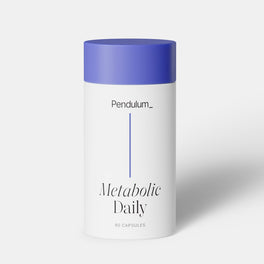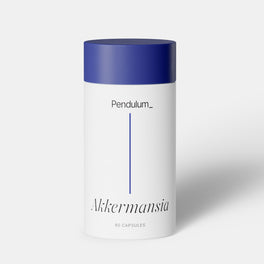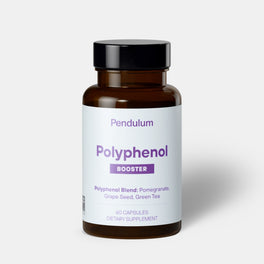Looks like your
cart is empty

Metabolic Daily
Improve metabolism

Akkermansia
Improves gut health

Polyphenol Booster
Increase antioxidants to protect cells
Stay in touch about special discounts, nutrition tips and additional education.
Looks like your
cart is empty

Improve metabolism

Improves gut health

Increase antioxidants to protect cells
Plugged up? You’re not alone. Constipation affects anywhere from one in six to one in ten people worldwide—and it’s more than just uncomfortable. It can cause painful abdominal cramping and disrupt your day. Luckily, we’ve got your back (and your bowels). If you're searching for probiotics for constipation relief, you're in the right place. Here’s how probiotics can get things moving again.
Constipation is fairly common and beyond inconvenient. When you’re backed up, it can significantly affect your quality of life, whether you feel bloated, crampy, or suddenly squeezed in your favorite jeans. The good news is, digestive health mirrors gut health, and improving yours may be the key to finding lasting digestive relief.
In this article, we’ll explore everything you need to know about constipation: what causes it, how probiotics can support regularity, and how to choose the best probiotic for constipation relief.
First, let’s clear up what constipation actually means. If you’re constipated, you’ll usually notice one or more of the following:
While many people experience occasional constipation, others struggle with it more regularly. No matter where you fall on the spectrum, knowing what’s behind the problem can help you manage it. Here are common triggers of constipation.
Your gut microbiome is the community of trillions of microorganisms that live in your gastrointestinal tract. A balanced microbiome supports healthy digestion and regular bowel movements. But when microbial balance is off, a condition known as dysbiosis, it can impact digestion and contribute to sluggish bowel movements.
Any number of factors can disrupt your microbiome. For example, antibiotics are a common culprit, wiping out the good bacteria along with the harmful ones. “Antibiotics significantly alter gut bacteria composition, reducing beneficial strains that produce short-chain fatty acids (SCFAs) like butyrate,” explains Alayna Hutchinson, MS, RDN, LDN Registered Dietitian at Pendulum Therapeutics. “SCFAs are essential for healthy gut motility, as they provide energy for colonocytes (the cells lining the colon) and stimulate muscle contractions in the colon.”
Fiber is critical for digestive health. It speeds up the movement of food through the digestive system, softens and adds bulk to the stool, making it easier to pass. Fiber also feeds the beneficial microorganisms in your gut to stimulate the production of butyrate—a key compound that supports a healthy gut lining and encourages the growth of other good microbes. If your diet lacks fiber, gut bacteria won’t get enough fuel to function and multiply. This may lead to microbial imbalances, weakened gut function, and constipation.
If you’re trying to improve digestion and combat constipation, add insoluble fiber, which helps food move quicker through the stomach and intestines. Good options include whole grains, wheat bran, nuts, and seeds.
Water helps lubricate your digestive tract, allowing food and waste to move smoothly through your system. It also mixes with stool to keep it soft and easier to pass. When you don’t drink enough water, you might end up with hard, dry stools that are difficult and painful to release.
Various medications, not just antibiotics, may interfere with normal gut function and slow down bowel movements.
The slow movement of stool through your digestive system is often caused by weak intestinal and pelvic floor muscles. When intestinal muscles lack strength, it can disrupt peristalsis, the wave-like contractions that move stool through your digestive tract. Pelvic floor muscles, located in the lower abdomen, can become weak if they are not properly coordinated, making it difficult to pass stool through the rectum.
Our gut and central nervous systems are closely connected through a pathway called the gut-brain axis. This means when you experience stress, it could affect the gut and potentially disrupt digestion. Constipated-related irritable bowel syndrome (IBS-C) involves uncomfortable abdominal symptoms, with constipation as the primary issue. The mechanism behind IBS-C may involve dysfunction of the gut-brain axis as a result of disruptions in the autonomic nervous system. This dysfunction may contribute to impaired gut motility and constipation.
Hormonal changes during pregnancy, perimenopause, and menopause slow down peristalsis and may increase the risk of constipation. Additionally, pregnancy and labor might weaken or strain the pelvic floor, which can make bowel movements more difficult.
Probiotics are live microorganisms (bacteria and yeast) that colonize the digestive system and support gut health and normal digestion. When your gut’s in good shape, it’s better equipped to handle stressors and triggers that may cause constipation. Adding the right probiotics to your routine may:
Some probiotic strains can also help the L-cells in your intestines produce more glucagon-like peptide-1 (GLP-1), a hormone involved in several metabolic pathways, like insulin production and satiety. Because this all happens within the body, probiotics may help balance hormone levels with few gastrointestinal side effects.
Promoting your body’s natural GLP-1 production could improve digestion and overall gut function, too. “Bacteria that produce butyrate (like certain Clostridium species) stimulate GLP-1 release while simultaneously supporting healthy gut motility through direct effects on colonocytes and intestinal muscle function,” says Hutchinson.

Not all probiotic supplements are created equal. They're most effective when you choose a product with strains targeted to your specific needs. Research has identified several probiotic strains that support gut function and digestive health, with promising potential to relieve constipation.
Clostridium butyricum produces butyrate, a SCFA that strengthens the intestinal lining and supports a strong gut barrier. This helps promote regular, healthy bowel movements and overall digestive balance. Butyrate also serves as an energy source for colonocyte cells. When butyrate levels are low (either from a lack of butyrate-producing bacteria like C. butyricum or a diet low in butyrate-rich foods), colonocytes face an energy deficit. This can compromise their function and trigger digestive distress.
Naturally produced butyrate is made directly in the colon—where it’s needed most—while supplements are often absorbed too early to be useful. So it’s generally far more effective to encourage natural butyrate production in the gut rather than rely on supplements for constipation relief. Plus, when you continuously feed beneficial bacteria, like C. butyricum, with dietary fiber you help ensure a consistent, localized supply of butyrate to maintain a healthy, self-sustaining gut ecosystem.
Akkermansia is a probiotic strain that makes up about 3% of the total gut bacteria in healthy adults. It supports gut barrier integrity by feeding on mucin, which in turn stimulates the body to produce more. This extra mucin promotes a healthier gut environment that nurtures the growth of beneficial bacteria. As a result, Akkermansia not only supports healthy digestion, but also may help ease gastrointestinal symptoms, like constipation.
C. beijerinckii produces two SCFAs, acetate and butyrate, that regulate the movement of waste through the intestines to promote bowel regularity. It also assists with the breakdown of complex carbohydrates, inhibits the growth of harmful bacteria, and encourages the growth of beneficial bacteria—all of which support healthy digestion.
Anaerobutyricum hallii produces both propionate and butyrate, SCFAs that stimulate the colon muscles and promote peristalsis, the muscle contractions that move stool through your digestive tract.
B. infantis helps the body digest complex carbohydrates and promotes the growth of beneficial bacteria in the intestines. In doing so, this strain can help ease symptoms of constipation. Additionally, it protects the gut by crowding out potentially harmful microbes and making it more difficult for them to proliferate in the microbiome.
Certain Bifidobacterium species are involved in the early stages of fiber digestion and produce compounds that nourish other beneficial gut microbes. This downstream effect contributes to butyrate production, further supporting intestinal barrier function and digestive health. Here’s some more detailed evidence around specific strains in this species:
Bacillus coagulans Unique IS2: May help alleviate symptoms of constipation, including the sensation of incomplete evacuation, painful bowel movements, and abdominal discomfort.
When shopping around for a probiotic for constipation relief, it’s important to weigh several factors, including:
When you first take a new probiotic supplement, it’s completely normal to experience changes in bowel habits initially. Bloating, gas, diarrhea, or constipation early on is usually just a sign that the probiotics are working to rebalance your microbiome.
Fortunately, these symptoms are usually mild and temporary. It can take anywhere from a few days to a few weeks for your discomfort to subside as the good bacteria settles in and colonizes your gut. If you experience severe abdominal pain or gastrointestinal distress, stop taking the probiotics and consult your healthcare provider.
Along with choosing a high-quality, clinically validated probiotic, these simple lifestyle tips can help your supplement work even better:

Occasional constipation is normal, but if it doesn’t improve with lifestyle changes and targeted probiotics, it’s time to check in with your healthcare provider for additional support. Regular bowel movements (ideally once every one to two days) are a sign of healthy digestion. That said, every body is different. Some people naturally go more often, and others go less frequently. A significant change in frequency, excessive straining, and/or consistently feeling like you haven't fully emptied your bowels may indicate an underlying issue.
Excessive straining can put pressure on your abdominal and pelvic floor muscles, which can exacerbate constipation and increase the risk of other complications. Seek immediate care if you're experiencing any of the following:
These symptoms could signal a more serious condition that requires prompt evaluation and care.
There isn’t a single “most effective” probiotic for constipation. Clinical studies support specific strains that promote digestion and gut health—key factors in relieving constipation. If you’re struggling with constipation, consider probiotic strains such as Clostridium butyricum, Akkermansia muciniphila, Bifidobacterium lactis, Clostridium beijerinckii, Anaerobutyricum hallii, Bifidobacterium infantis, Bacillus coagulans, and Bifidobacterium lactis.
Additionally, combining these probiotic strains with healthy lifestyle habits can further relieve constipation. Eating more fiber, staying hydrated, choosing polyphenol-rich foods, moving regularly, and reducing high-fat foods can all support better digestion. For personalized advice on which probiotic strains might be most effective for you, consult your healthcare provider.
“Probiotics, particularly those containing strains that produce butyrate, are a viable option to help ease constipation,” explains Berggren. Butyrate supports overall gut health, strengthens the gut lining, and can improve gut motility—all of which may improve bowel movements. Strains in the Clostridium species and Anaerobutyricum hallii produce butyrate directly, and certain Bifidobacterium species help nourish other beneficial microbes that produce butyrate.
Wondering “what is the best probiotic for constipation?” While there’s no universal answer experts agree on, certain probiotics strains show promising results in supporting both digestive and gut health. Strains like Bifidobacterium lactis, Akkermansia muciniphila, and Clostridium butyricum may improve gut mechanisms that can improve bowel movements.
“Strains that produce butyrate or other SCFAs are particularly beneficial because they directly support healthy gut motility and intestinal muscle function,” says Hutchinson. “Research shows that probiotics work best for constipation when they address underlying causes like microbiome imbalance, reduced SCFA production, or compromised gut barrier function.” The key is to choose well-researched, targeted strains and give them time to establish themselves in the gut microbiome.
If you’re having trouble “going,” consider adding a probiotic to your arsenal to support overall gut and digestive health. Paired with healthy lifestyle and dietary habits, probiotics may help improve bowel movement regularity and frequency, and symptoms of constipation. Look for a supplement with targeted strains such as Bifidobacterium lactis, Akkermansia muciniphila, and Clostridium butyricum, which have been studied for their potential to promote gut health and regular digestion.
Your diet and daily habits matter too. Start by taking a closer look at what you’re eating. For example, try to include more insoluble fiber (found in whole grains, nuts, and seeds), to promote movement through the gut, and add polyphenol-rich foods like berries, green tea, and olives to support overall gut health. Sometimes, all it takes is a quick walk after a meal to get things moving.
If you’ve ever had the sense that travel throws off your digestion and bowel habits, you’re not imagining things. “Traveling causes a disruption in your gut microbiome, which may lead to some gastrointestinal issues like constipation,” says Berggren. “Additionally, the change in diet and water intake may also have an effect on bowel movements.”
Comfort is another challenging factor. The stress and overwhelm of traveling—whether it’s from long flights, unfamiliar environments, or changes in routine—can slow down gut motility and may cause constipation. This disruption in the gut-brain axis can interfere with digestion and make it more difficult to have regular bowel movements when traveling.
If you're dealing with jet lag, that can make things even worse. Research shows that your gut microbes are closely tied to your circadian rhythm, so when your normal sleep-wake cycle suddenly shifts, it can affect your digestive system and may cause less-frequent bowel movements.
Content is for educational purposes only and has not been evaluated by the Food & Drug Administration. Statements and products are not intended to diagnose, treat, cure, or prevent any disease.